Table of Contents
Menopause Self-Care Routines That Actually Work
Beyond the Buzzword of “Self-Care”
The phrase self-care gets tossed around everywhere these days, from spa ads to Instagram captions. But for women navigating menopause, self-care isn’t a luxury—it’s a lifeline. Between hot flashes, mood swings, disrupted sleep, and shifting body rhythms, menopause can feel like a whirlwind.
The good news? Self-care during menopause doesn’t have to mean bubble baths or expensive wellness fads. It’s about creating practical, science-backed routines that bring comfort, stability, and joy to your daily life. In this guide, we’ll break down menopause self-care routines that actually work—because your well-being deserves more than quick fixes or empty promises.
Morning Rituals That Set the Tone
Most people underestimate mornings. For menopausal women, mornings often carry the residue of disrupted sleep, night sweats, or racing thoughts. That’s why your morning isn’t just the start of the day—it’s the reset button.
Hydrate First Thing: Overnight, your body loses fluid through breathing, sweating, and disrupted sleep. Starting with a full glass of water replenishes tissues—including skin and vaginal lining. Bonus tip: add a squeeze of lemon or a pinch of sea salt for natural electrolytes.
Gentle Movement, Big Impact: Instead of rolling straight into your phone, roll out of bed and give your body five minutes of gentle stretching. Neck rolls, shoulder circles, or yoga cat-cow poses loosen stiffness and awaken circulation.
Mindful Breathing: Deep breathing exercises don’t just calm nerves—they reduce cortisol and stabilize blood sugar. Try “box breathing”: inhale for 4 counts, hold 4, exhale 4, hold 4. It’s a simple way to tell your body: you’re safe, you can relax.
Breakfast with a Purpose: Think of breakfast as fuel for hormone stability. Pair protein with slow-digesting carbs—like oatmeal with almond butter and berries—to avoid the blood sugar roller coaster that worsens mood swings.
Building Movement Into Your Day
Exercise is not about punishment; it’s about creating energy reserves. In menopause, activity also becomes a form of medicine. The goal? Not weight loss, not “bikini body”—but mobility, strength, and confidence that carries you into the next decades. Follow these tips:
Mini Bursts of Movement: If life feels too busy for a gym schedule, sneak in “movement snacks.” Do ten squats while brushing your teeth. A brisk 5-minute walk between Zoom calls. These micro-routines keep metabolism engaged.
Strength Rituals as Protection: As estrogen drops, bones lose density. Lifting weights—or even doing resistance band exercises at home—signals your bones to stay strong. Think of each rep as a “deposit” into your bone bank.
Joyful Cardio: Forget the treadmill dread. Dance in your kitchen. Hike with a friend. Swim in a nearby pool. When exercise is framed as play, it becomes something you crave, not avoid.
Stretching as Medicine: Hip openers and back stretches reduce stiffness that often worsens with hormonal changes. Even a 10-minute nightly stretch routine can improve sleep quality.
Food as Daily Self-Care
Food during menopause isn’t just fuel—it’s information for your body. Each meal is an opportunity to soothe inflammation, stabilize mood, and restore energy. Keep in mind that food isn’t about restriction now—it’s about nourishment, variety, and joy.
Meal Prep with Compassion: Prepping nourishing snacks (like hummus with carrots or Greek yogurt with flaxseed) keeps you from reaching for processed quick fixes. Menopause hunger is real; being prepared makes all the difference.
Colorful Plates, Colorful Moods: Antioxidants from berries, leafy greens, and orange veggies not only protect skin and heart health but also give meals vibrancy. Science shows women who eat more plant-based antioxidants experience fewer hot flashes.
Protein Power: Estrogen decline accelerates muscle loss. Protein at every meal—chickpeas, salmon, eggs, lentils—preserves muscle and balances hunger hormones.
Mindful Eating as a Ritual: Menopause can shift digestion. Slowing down, chewing thoroughly, and avoiding multitasking during meals improves absorption and reduces bloating.
Skin and Body Rituals
Menopause can change your skin almost overnight—thinner, drier, more sensitive. Self-care here is about rebuilding comfort and confidence.
Moisturize Strategically: Apply creams right after showers to lock in hydration. Look for ceramides and hyaluronic acid.
Sun Protection: With less estrogen, skin becomes more vulnerable to UV damage. SPF is your new best friend—even on cloudy days.
Vaginal Comfort: Hormone-free moisturizers and supplements (like Flower Power’s She Juicy™ with slippery elm bark) help restore natural moisture from the inside out. No shame, just science-backed support.
Pampering Touches: Dry brushing or warm baths with Epsom salts soothe muscles and give you a sensory reset.
5. Stress and Emotional Balance
Hormonal changes often amplify stress, leaving women feeling irritable or overwhelmed. Building emotional self-care into your routine is essential.
Daily Journaling: A few minutes of writing clarifies emotions and tracks patterns. Are hot flashes worse on stressful days? Journaling can reveal triggers.
Meditation Apps: Guided sessions make mindfulness approachable, even if you’ve never meditated before.
Creative Outlets: Painting, music, or gardening activate joy and distract from discomfort.
Boundaries as Self-Care: Saying “no” to draining commitments creates more space for rest.
Emotional health is not separate from physical health—it’s deeply interconnected. Stress management is menopause management.
6. Sleep Rituals That Actually Work
Insomnia is one of the most common complaints during menopause. Self-care at night is about creating signals that tell your body it’s safe to rest.
Wind-Down Hour: Turn off screens, dim lights, and do something soothing like reading or listening to calming music.
Consistent Bedtime: Going to bed and waking up at the same time trains your circadian rhythm, even if you didn’t sleep perfectly.
Cool Environment: A fan, breathable sheets, and moisture-wicking pajamas can reduce night sweats.
Herbal Helpers: Teas with chamomile, valerian root, or lavender provide gentle relaxation.
Good sleep is the foundation for energy, mood, and resilience the next day. Protect it like your most precious resource.
8. Making Self-Care Sustainable
The biggest mistake women make is thinking self-care has to be big. Truth: consistency beats intensity every time.
Habit Stacking: Pair a new habit with an existing one. Example: do a 5-minute stretch while your coffee brews.
Micro-Routines: Even 2 minutes of deep breathing or applying moisturizer counts as self-care.
Weekly Check-Ins: Ask yourself: What worked this week? What drained me? Adjust accordingly.
Self-care during menopause is not about perfection; it’s about progress. Small, consistent acts add up to resilience.
FAQs: Self-Care in Menopause
Is self-care just another word for pampering?
Not at all. While pampering can be fun, menopause self-care goes deeper. It’s about managing symptoms, building resilience, and protecting long-term health. A face mask is nice, but consistent sleep hygiene, hydration, and stress reduction change your daily experience.
Can self-care replace medical treatment?
No, but it can complement it beautifully. Think of self-care as the daily foundation, while medical treatments (when needed) are the specialized tools. Together, they make life smoother and healthier.
I feel guilty taking time for myself. How do I overcome that?
Reframe self-care as maintenance, not indulgence. Just as your car needs oil changes, your body needs regular tending. You can’t pour from an empty cup—and caring for yourself allows you to show up better for others.
What if I can’t stick to a perfect routine?
Forget perfection. Menopause is unpredictable, and your self-care should be flexible enough to adapt. If you miss a day, don’t abandon the habit—restart the next morning. Progress, not performance, is what matters.
Which self-care habit should I start with first?
Pick the one that feels easiest and most joyful. Maybe it’s a morning glass of water, a short evening walk, or journaling before bed. Once that becomes second nature, layer in another. Self-care builds like a playlist—one track at a time.
Reframing Menopause Through Self-Care
Menopause often gets framed as loss—loss of youth, fertility, energy. But with intentional self-care, it can become a season of reclamation. Reclaiming rest. Reclaiming joy. Reclaiming ownership over your body in a way that feels empowering, not limiting.
Self-care routines aren’t fluff—they’re tools for transformation. And when they’re tailored to your needs, they don’t just help you survive menopause. They help you thrive through it.










